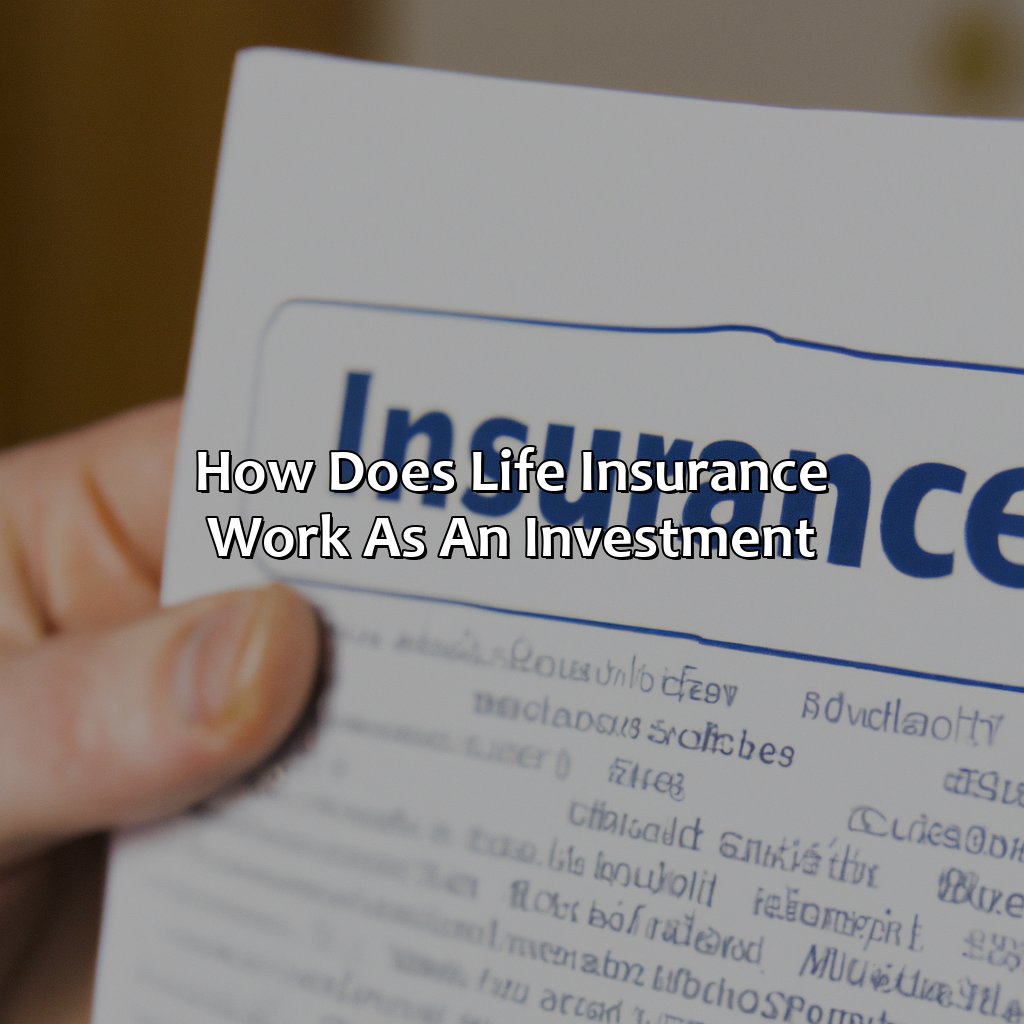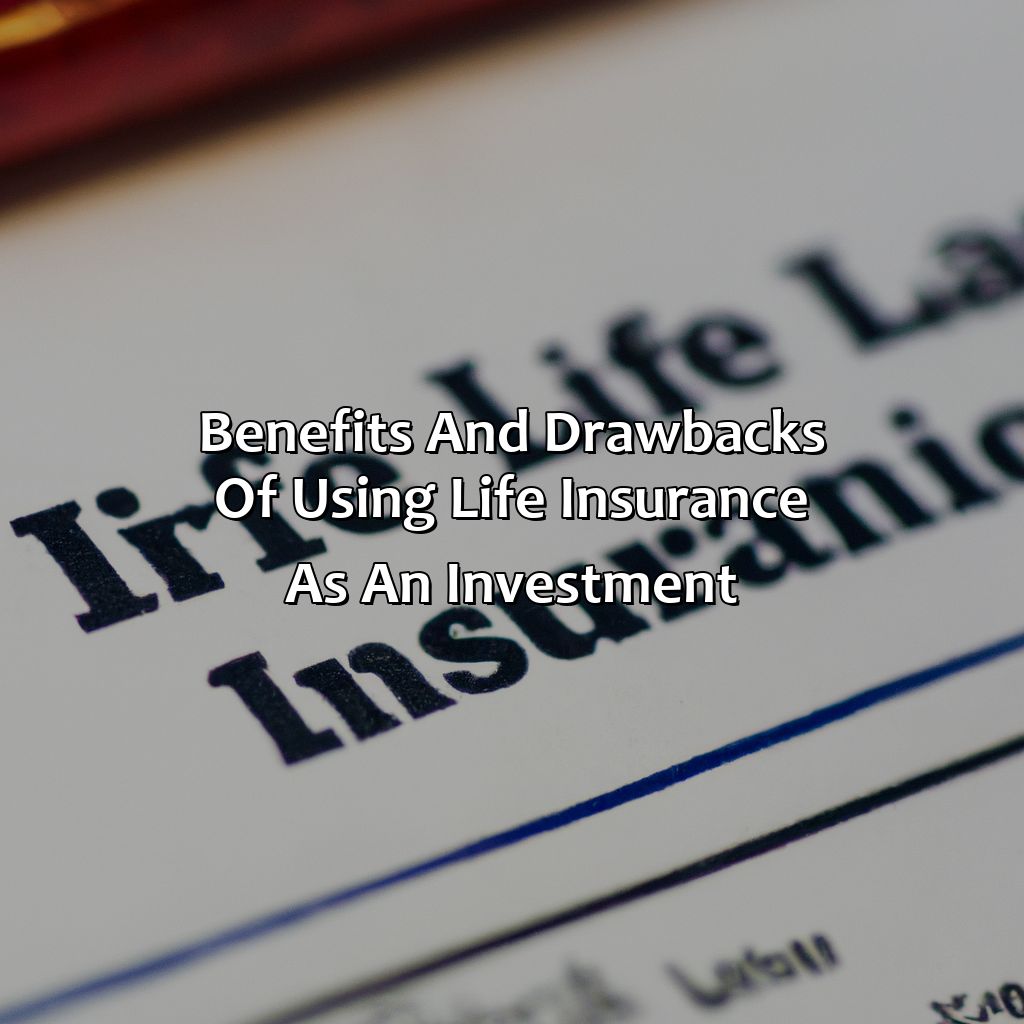How Can Life Insurance Be Used As An Investment?
Key Takeaway:
- Life insurance can be used as an investment through cash-value policies, variable life insurance, and universal life insurance. These policies allow policyholders to build cash value over time, which can be withdrawn or borrowed against.
- One major benefit of using life insurance as an investment is the tax advantages, as the cash value grows tax-deferred and can be withdrawn tax-free in certain circumstances. However, high fees and expenses can eat into the returns, and there is a risk of losing the investment if the policy is surrendered or lapses.
- When considering using life insurance as an investment, it is important to carefully evaluate the policy and consider all costs and risks before committing.
Are you looking for an investment option that can provide both protection and growth opportunities? Life insurance can be an ideal solution for you. You can use life insurance to secure your financial future and build a hedge against life’s uncertainties. Learn how here.
How does life insurance work as an investment?
Grasping how life insurance is an investment? It’s not just about death benefits. Cash-value policies, variable life insurance, and universal life insurance are three types of life insurance that build up cash value over time. Let’s look into the basics of life insurance as an investment and check out the types of policies available.

Image credits: retiregenz.com by Yuval Woodhock
Cash-value policies
Life insurance policies that offer cash value are a form of long-term investment. These types of policies not only provide death benefits but also have an accumulated savings component. The cash value grows over time and can be borrowed against or used to pay premiums, among other things.
In contrast to term insurance policies that only cover a designated period and do not accumulate any value, cash-value policies can provide a way for individuals to build wealth as they make premium payments. There are different types of cash-value policies such as whole life, universal life, and variable life.
However, it is important to note that cash-value policies typically have higher premiums than term-insurance options and the returns may not always match those of other long-term investments such as stocks or mutual funds. Additionally, accessing the cash value may come with fees or require surrendering the policy altogether.
If choosing a cash-value policy as an investment opportunity, consider seeking advice from a financial advisor who can help determine if it aligns with your long-term goals and overall financial plan.
Variable life insurance: Perfect for those who want their investments to be as unpredictable as life itself.
Variable life insurance
Life insurance policies with variable premiums and returns based on market performance are called dynamic life insurance policies. Policyholders invest a portion of their premium payments into various investment funds made of stocks, bonds, and different financial instruments. The cash value of the policy rises as the investments generate income, all while the death benefit protection remains constant.
Variable life insurance policies offer numerous investment options and allow policyholders to customize their benefits according to their risk tolerance. Depending on the type of policyholder’s cash value account preferences, the investments may earn tax-deferred returns, and if surrendered or sold, it is subject to capital gains taxes.
Pro Tip: It is crucial to consult with an expert before investing in variable life insurance as these types of policies involve risks that could affect the investment’s performance over time.
Universal life insurance: when you’re not sure if you want life insurance or a retirement plan, why not both?
Universal life insurance
This type of life insurance offers flexible investments coupled with protection. Payments are divided to fund the insurance and savings components. The policy owner directs the investment choices within certain guidelines.
The flexibility of universal life insurance allows for investments in stocks, bonds, or mutual funds beyond a fixed interest rate, and it also enables premium payments adjustments to fluctuate with personal financial situations. In essence, plan owners build cash value and can borrow against it or withdraw without penalty at specific times.
Furthermore, some universal life policies (Indexed Universal Life) offer cash value growth tied to the stock market index in which case there is no risk or loss, but usually with lower potential gains compared to regular investments like stocks.
A Forbes article states “the cash-value accumulation feature that comes with permanent life insurance can provide tax-deferred monetary benefits.”
Life insurance as an investment: great returns on your money, but unfortunately, you won’t be alive to enjoy them.
Benefits and drawbacks of using life insurance as an investment
This section explores the pros and cons of life insurance investment. Tax benefits, high fees and expenses, and the risk of loss are discussed. Knowing these implications will help you decide if this is the right investment for you.

Image credits: retiregenz.com by Harry Duncun
Tax advantages
Life insurance can offer significant tax benefits. The premiums paid towards a life insurance policy are usually not taxed, meaning that the initial amounts invested don’t incur taxes. Additionally, if you hold the policy until your death, the payout to your beneficiaries is generally tax-free.
Furthermore, some types of life insurance policies allow for tax-deferred accumulation of cash value, which means that you don’t have to pay taxes on any earnings on the investments during the accumulation phase. You only pay taxes when you withdraw funds from the policy.
It’s also worth noting that some life insurance policies allow for tax-free loans against the cash value of the policy. These loans can be used during emergencies or for other purposes while maintaining the policy’s coverage.
A study by Forbes revealed that over 50% of businesses consider life insurance as an essential element for business succession planning.
Life insurance as an investment can be expensive, but at least you won’t have to worry about your loved ones’ financial security after you’ve bankrupted yourself.
High fees and expenses
While the expenses and fees associated with life insurance investments can be a concern, there are several key points to consider.
- 1. it is important to understand that life insurance companies incur significant costs in underwriting and managing policies. These costs are reflected in the fees charged to policyholders.
- 2. some types of life insurance policies, such as whole life or universal life policies, come with higher fees due to their added features and benefits beyond pure life coverage.
- 3. it’s important to compare fees and expenses across different policy providers and products before making any investment decisions. Some providers or products may offer lower fees but also have less robust coverage or investment options.
It’s worth noting that while high fees and expenses may seem concerning, they can often be outweighed by the long-term benefits of life insurance investments. Potential benefits include tax advantages, flexibility in accessing funds, and a guaranteed death benefit for beneficiaries.
It’s crucial for investors to carefully weigh these factors against their own financial goals and priorities when considering using life insurance as an investment vehicle.
According to Investopedia, “the average cost of term life insurance is around $30/month for men aged 35-45 years old with healthy lifestyles.”
Life insurance as an investment: the only guaranteed return on investment is when you pass away, but at least you won’t be around to suffer the loss.
Risk of losing the investment
The potential loss of invested funds is a crucial factor to consider when using life insurance as an investment. One must carefully assess the policy’s terms and conditions to avoid unforeseen circumstantial losses.
Moreover, the risks posed by investment-related fees can impede the profit-making potential of life insurance investments. During the early stages of investment, such fees can consume a substantial portion of the premiums paid towards investment. While this impact may lessen over time, one must be aware of what percentage their investment company charges as fees.
It is essential to understand that laws and regulations concerning life insurance investments vary between states, so investors must conduct thorough research in accordance with these policies before investing.
One suggestion would be to work with a licensed financial advisor who has experience working with life insurance policies as investments and has knowledge about each state’s unique tax laws on premium payments. Additionally, transitioning life insurance policies into an annuity may help mitigate risks associated with market volatility while providing opportunities for significant returns.
Five Facts About How Life Insurance Can Be Used as an Investment:
-
Life insurance policies can accumulate a cash value over time that can be used as an investment. (Source: The Balance)
-
The cash value of a life insurance policy can be accessed through loans or withdrawals. (Source: Forbes)
-
The cash value in a life insurance policy can be used to pay premiums or be surrendered for cash. (Source: Investopedia)
-
Life insurance policies can offer tax advantages for investment purposes. (Source: NerdWallet)
-
There are different types of life insurance policies that can be used as investments, such as whole life, universal life, and variable life insurance policies. (Source: Policygenius)
FAQs about How Can Life Insurance Be Used As An Investment?
How can life insurance be used as an investment?
Life insurance can be used as an investment by choosing a policy that has a cash value component. The cash value grows over time and can be accessed tax-free through policy loans or withdrawals. This can provide a source of funds for emergencies or be used as a source of retirement income.
What types of life insurance policies can be used as investments?
Whole life insurance, universal life insurance, and variable life insurance policies can all be used as investments. These policies have a cash value component that grows over time, providing a savings or investment component in addition to the death benefit.
Can the cash value in a life insurance policy be used for any purpose?
Yes, the cash value in a life insurance policy can be used for any purpose. It can be used to fund a child’s education, pay off a mortgage, or provide retirement income. The policy owner has the flexibility to access the cash value when needed.
What are the tax implications of using life insurance as an investment?
The cash value in a life insurance policy grows tax-deferred, which means that taxes are not owed on the growth until the cash value is accessed. If the cash value is accessed through policy loans or withdrawals, the amount received is generally tax-free.
Is life insurance a good investment for everyone?
Life insurance can be a good investment for people who have a need for life insurance and are looking for a way to grow their savings or investment portfolio. However, it may not be the best investment option for everyone, as the fees and expenses associated with life insurance policies can be higher than other investment options.
What should I consider when using life insurance as an investment?
When considering using life insurance as an investment, it is important to review the fees and expenses associated with the policy, as well as the performance of the investment component. It is also important to understand the tax implications of accessing the cash value and the impact it may have on the death benefit. Working with a financial advisor can help in making an informed decision about using life insurance as an investment.
 Checkout this IRS Loophole
Checkout this IRS Loophole 
